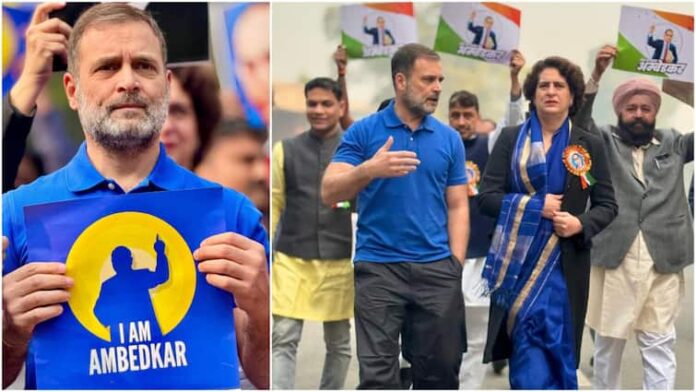Rahul Gandhi was seen sporting a blue T-shirt as he staged a protest outside the Parliament. This departure from his usual white T-shirt immediately caught attention. Rahul Gandhi is often seen pairing his white T-shirt with a pair of dark blue or black baggy trousers or cargo, and fisherman sandals or sneakers. So, the blue outfit amid the protests over Amit Shah’s “Ambedkar fashion” remark grabbed eyeballs instantly.
Rahul Gandhi ब्लू कलर की टीशर्ट में..
जय भीम। pic.twitter.com/U6BDqgIRrH
— Rahul Kajal INC 🇮🇳 (@RahulKajalRG) December 19, 2024
Why Does Rahul Gandhi Wear A White T-Shirt?
Right before the Lok Sabha elections, Rahul Gandhi had revealed why he prefers a white T-shirt. In fact, he wore the white T-shirt in the biting cold during the Bharat Jodo Yatra in December-January 2022. He had then said that he doesn’t feel cold and that he feels for the poor in the nation who have never been asked if they suffered from the cold or not.
On his birthday on June 19 ahead of the Lok Sabha polls this year, he said: “I am often asked why I always wear a ‘white T-shirt’ – this T-shirt symbolises transparency, solidity and simplicity for me.”
जन्मदिन की शुभकामनाओं के लिए आप सभी का दिल से धन्यवाद।
मुझसे अक्सर पूछा जाता है कि मैं हमेशा ‘सफेद T-shirt’ क्यों पहनता हूं – यह T-shirt मेरे लिए पारदर्शिता, दृढ़ता और सरलता का प्रतीक है।
आपके जीवन में ये मूल्य कहां और कितनी उपयोगी हैं ये #WhiteTshirtArmy इस्तेमाल कर मुझे एक… pic.twitter.com/B89cI2zDEu
— Rahul Gandhi (@RahulGandhi) June 19, 2024
Why Did Rahul Gandhi Wear A Blue T-Shirt To Parliament On Dec 19?
Rahul Gandhi wore a blue T-shirt to the Parliament to express his support and respect for BR Ambedkar, a staunch advocate of the Dalit community. Rahul Gandhi is participating in the Opposition’s protests against Union Home Minister Amit Shah over his ‘Ambedkar fashion’ remark, in which the latter allegedly insulted the BR Ambedkar.
VIDEO | Congress MPs Rahul Gandhi (@RahulGandhi) and Priyanka Gandhi Vadra (@priyankagandhi), along with other opposition MPs, protest in Parliament premises, demanding apology and resignation of Union Home Minister Amit Shah over his remarks on Dr BR Ambedkar.
(Full video… pic.twitter.com/mdrfoYqXQg
— Press Trust of India (@PTI_News) December 19, 2024
This is probably the first time Rahul Gandhi was seen in public wearing any colour other than white or black.
Aazad Samaj Party (Kanshi Ram) chief Chandrashekhar Azad and BSP supremo Mayawati also sport the blue colour in their clothes.
Why Is Blue Associated With Ambedkar And Dalits?
The association of the colour blue with BR Ambedkar and the Dalit community in India is deeply rooted in historical, cultural, and symbolic significance. This connection has evolved over decades, reflecting Ambedkar’s personal preferences, political actions, and the broader struggle for Dalit identity and empowerment.
Ambedkar’s Personal Preference for Blue
B R Ambedkar, the principal architect of the Indian Constitution and a champion for social justice, had a personal affinity for the colour blue. He often wore a blue coat, which became emblematic of his identity and ideals, according to a report in the Indian Express. This choice was not merely aesthetic; it also symbolised his vision of equality and non-discrimination. The blue coat has been immortalised in statues and portraits of Ambedkar, reinforcing its significance as a representation of his legacy.
Political Symbolism Of Ambedkar’s Blue
Blue gained political importance when Ambedkar founded the Scheduled Castes Federation in 1942, adopting a blue flag adorned with the Ashok Chakra. This flag was later retained by the Republican Party of India, established by Ambedkar in 1956. The adoption of blue as a political colour has allowed it to become synonymous with Dalit identity and activism. Political parties like the Bahujan Samaj Party (BSP) and ASP, who advocate Dalit welfare and development, have embraced this colour as part of their branding, further embedding it into the fabric of Dalit politics.
Blue — A Symbol Of Empowerment
For many Dalits, blue transcends its status as a mere colour. It embodies empowerment and resistance against oppression. The colour is seen as a representation of unity among marginalised communities, symbolising their collective struggle for rights and recognition under the vastness of the sky. Dalit activist SR Darapuri was quoted as saying in media reports from 2018 that the idea has been articulated by scholars who note that “under the blue sky, everyone is equal”.
This concept resonates particularly well within the context of Dalit protests and movements where blue flags are prominently displayed as a sign of solidarity and strength.
